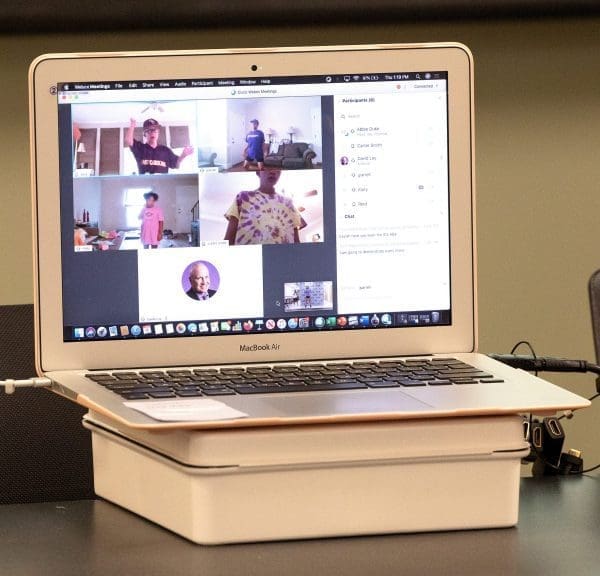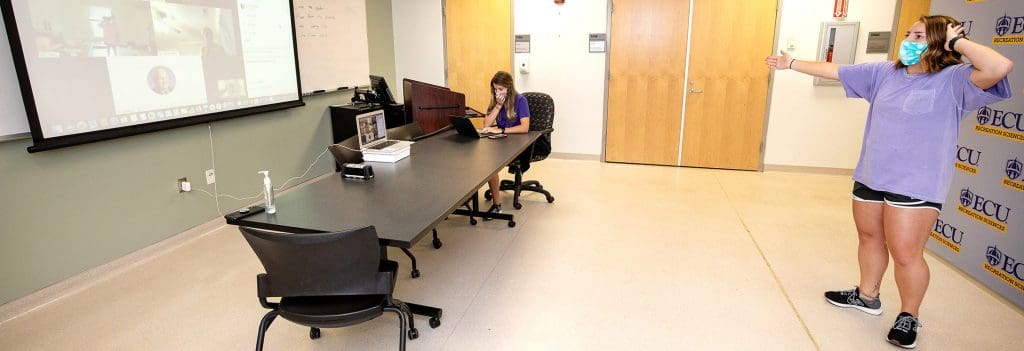
It’s a pretty typical summer camp scenario: Activity leader and East Carolina University rising senior Abbie Duke enthusiastically greets her campers, signing hello to Laylah Yarrell, who is deaf. Then she fills the group in on their plan for the session — dancing, which elicits a sigh of, “Oh, man!” from Reid Haddock. A short time later, though, he’s happily stomping, sliding, jumping and wiggling with the group to a dance from the animated film “Ice Age.”
What’s not so typical? They’re gathering — and dancing — virtually.
The pandemic closed many camps and programs where recreational therapy majors typically complete the fieldwork experiences they need to take upper level courses.
“Our students really needed field experience this summer to keep moving through the program and graduate as planned,” said associate professor David Loy. “So, we got creative.”
The result? The Pirate Wellness Program, a free virtual camp for individuals with disabilities. The six-week sessions meet the major’s fieldwork requirements and created an opportunity to serve local families.

Each week begins with a “treasure bag” drop-off of supplies for the week’s planned activities. The bags are safely left on campers’ doorsteps on Monday and collected on Friday, with campers often greeting their counselors from their windows. Then campers and counselors virtually meet as a group six times throughout the week for 30-minute sessions focused on areas including arts and crafts, cooking and wellness, and physical activity, as well as stress management, cognitive exercises and social skills. Campers also meet with a counselor for a weekly one-on-one session to work on individual goals.
Loy and his students assess each session, discussing what worked well (or didn’t), campers’ engagement and any lessons learned for the next session.
“For our first session, with children, we set a maximum of six campers. We really rely on family help in their homes and they’ve been so great. I’ve been surprised by how well things have worked virtually,” said Loy. “The tech has actually been flawless. It can be hard to keep everyone’s attention via camera, but our students have done a great job of keeping campers engaged. I think everyone – students and campers – has had a positive experience. It’s been really cool to see.”
Duke and fellow recreational therapy majors Lance Davis, McKayla Aldridge and Lina Bartholomew lead sessions both from their respective homes and from a classroom on campus where one student leads the session and another provides support, either technical or activity related.
“I’d never thought that I’d be providing therapy virtually,” said Duke. “Not being able to be hands-on can be challenging; you can’t always see little things that you would in person. But whether you’re in person or virtual, you never know how a session is going to go. I’ve learned how to adapt. And how to make an activity work for multiple people with different needs so that everybody gets something out of it.”
One thing participants are getting is social interaction that they might be missing. “My daughter absolutely loves to see everyone,” said Mary Sours, whose 10-year-old daughter Amelia is taking part in the camp. “She knows some of the other kids but hasn’t been able to see them in person, so it’s pure joy on Amelia’s part. She’s so excited and watching the clock for the start of each session. And the rec therapy students are amazing. They work hard to make a connection and it’s made such a difference in our summer.”
Jennifer Haddock’s 9-year-old son Reid is one of the program’s participants. “Having that structured time has been wonderful for Reid. And 30 minutes at a time is perfect for his attention span. He’s always excited to show me what he’s done. He really likes the arts and crafts projects and he loves the cooking sessions. He’d never shown an interest in cooking before, but now, I’m getting him involved in cooking with me,” she said.
“I’m very impressed with Dr. Loy and the students. They’re so organized, so well thought-out. This has to be hard to do virtually. It’s been great for our family.”
The program’s second session, beginning in August, will focus on senior citizens with disabilities in partnership with the Pitt County Council on Aging.
Read the original East Carolina University article.